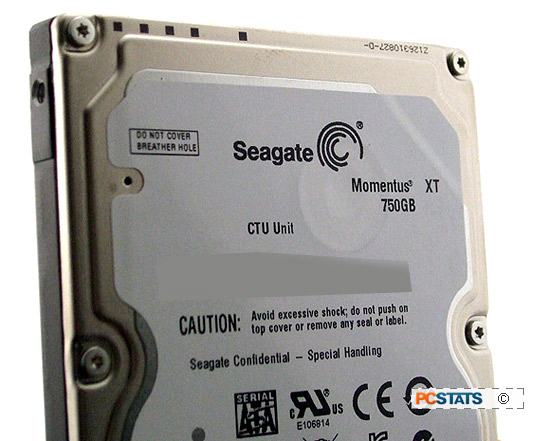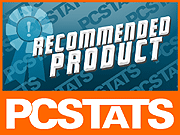 File
Copying File
Copying |
|
|
For this
test a single 8.5GB file is copied from an OCZ Vertex 2 SSD system disk to the
test disk (write to), from the test disk to the OCZ Vertex 2 SSD (read from),
and from the test disk to itself (read and write to self). While this test is
heavily influenced by the SATA controller and by the number of files being
transferred, it provides a good indication of the sustained transfer rates
capable from the hard drive being tested. Higher transfer speeds are best.
 Large File Transfer Test
- 8.5GB Single File Large File Transfer Test
- 8.5GB Single File |
| Avg. Speed: Write To: |
MB/s |
Ranking |
| OCZ Vertex 2 128GB SSD |
56 |
   |
| Plextor PX-128M1S SSD |
51 |
   |
| Seagate 2TB Barracude XT HDD |
51 |
   |
 Seagate 750GB Momentus
XT SSHD Seagate 750GB Momentus
XT SSHD |
59 |
   |
| Seagate 500GB Momentus XT SSHD |
39 |
   |
| Avg. Speed: Read From: |
MB/s |
Ranking |
| OCZ Vertex 2 128GB SSD |
49 |
   |
| Plextor PX-128M1S SSD |
63 |
   |
| Seagate 2TB Barracude XT HDD |
58 |
   |
 Seagate 750GB Momentus
XT SSHD Seagate 750GB Momentus
XT SSHD |
47 |
   |
| Seagate 500GB Momentus XT SSHD |
45 |
   |
| Avg. Speed: Read / Write To Self: |
MB/s |
Ranking |
| OCZ Vertex 2 128GB SSD |
60 |
   |
| Plextor PX-128M1S SSD |
48 |
   |
| Seagate 2TB Barracude XT HDD |
51 |
   |
 Seagate 750GB Momentus
XT SSHD Seagate 750GB Momentus
XT SSHD |
38 |
   |
| Seagate 500GB Momentus XT SSHD |
36 |
   | |
This is
just a fun test to see gage real world impact on large file copying and pasting.
A simple copying test in Windows Explorer shows what advantage the 750GB Seagate
Momentus XT SATA III drive has over the previous 500GB Seagate Momentus XT SATA II drive. Across the
board, the 2nd Gen. Momentus XT posts marginally quicker data transfer rates
than the 1st Gen. Momentus XT.
 Hybrid Conclusions
Hybrid Conclusions
As we consider the merits of Seagate's
2nd Gen. Momentus XT SSHD hard drive we find ourselves instinctively drawing
comparisons between hard drives and solid state drives.
Hard drives have the undeniable benefit of low cost per
gigabyte and high data reliability. On the other hand, Solid State Drives are
incredibly fast on all counts, but more expensive per gigabyte of storage and
not very fault tolerant when something goes awry.
Seagate's Momentus XT offers an interesting mix of HDD
and SSD technologies and costs about $0.33/GB, but in no way should you think of
it as a 50/50 technology split.
Simple math tells us the Momentus XT is 99% hard drive
with 1% SSD flash memory tacked on. So perhaps instead of calling it a Solid State Hybrid Drive - SSHD, a more accurate name
might be Hard Disk Drive Hybrid?
In any case, the hard drive benchmarks have demonstrated
that the 2nd Gen Seagate Momentus XT is quicker than Seagate's 1st Gen. model
and comparable to the not so special Plextor PX-128M1S SSD in a few tests.
Generally speaking, a straight up SSD will pull (way) ahead on both read and
write tests, but fall sharply behind on economics. The Momentus XT does however
outperform full size 3.5" HDDs like the Western Digital 1TB WD1001FALS and
Seagate 2TB Barracuda XT.
On the price per GB front, a typical 120GB SSD runs
~$1.58/GB, a 1TB desktop HDD $0.20/GB and a 2TB HDD $0.125/GB. Seagate's Hybrid
Momentus XT costs $0.33/GB, whereas a vanilla 750GB Seagate notebook drive will
run about $0.21/GB. There is a premium to Seagate's Momentus XT to consider,
certainly.
Data integrity is a critical factor with any flash based
storage device. If the NAND flash ever fails or wears out, a built in TRIM
function marks those bits off bounds automatically in the Momentus XT. Seagate
choose SLC NAND flash which is rated to 100,000 cycles - it's enterprise class
NAND flash. Many low cost SSD' use MLC NAND flash which is cheaper, but only
rated to 10,000 cycles.
The key take away from the benchmarks is that the 750GB
Seagate Momentus XT can yield
"like-SSD responsiveness" to frequently used applications only when the
situation suits it. Application specific benchmarks see a noticeable improvement
to their results after about three-to-five iterations, unlike an SSD which tends
to witness across the board enhancements. The Momentus XT's write speed is
limited to the speed of the hard drive component since this hybrid design writes
data to the physical disks first, then to the SSD if the data qualifies. In
synthetic HDD benchmarks the Momentus XT 750GB does not witness any significant
like-SSD advantages because test data is largely random, thus the Adaptive
Memory algorithm doesn't cache it.
Hybrid in today's environment
Seagate dangles a
tantalizing carrot when it states there's no reason its hybrid drive
technology can't be tacked onto a larger capacity desktop drives. It could be
dropped onto a 3TB Barracuda for example... and all signs point to Seagate's
upcoming 3TB Barracuda being a hybrid. The hybrid technology is
completely transparent to the computer, no drivers are required and the device
is system agnostic (doesn't care if its in a Mac, PC, with an Intel AMD CPU),
comparable technologies like Intel SRT cannot boast such conveniences. As a 2.5"
HDD the 750GB SATA III Seagate Momentus XT performs well in it's own respect, as
a novel way to improve system responsiveness the hard drive is definitely
worthwhile drive to consider.

Find out about this and many other reviews by joining
the Weekly PCstats.com Newsletter today! Catch all of PCSTATS
latest reviews right here.
Related Articles
Here are a few other articles that you might enjoy as
well...
- IcyDock MB973SP-B Tray-less 3-Bay SATA Hard Drive Bay
Module
- Plextor PX-128M1S 128GB Solid State Drive / SSD
Review
- Seagate Barracuda XT Preview - Worlds First SATA 6Gb/s 2TB
Hard Drive
- Western Digital Caviar Black WD1001FALS 1.0TB SATA Hard
Drive Review
- IcyDock MB673SPF-B 3-Bay Tooless Hard Drive Bay Module
- IcyDock MB674SPF-B 4-Bay Tooless Hard Drive Bay
Module
- Icydock MB664US eSATA/USB External Hard Drive Enclosure
Review
- IcyDock MB454SPF-B SATA 4-Bay Hot-Swap 3.5-inch Drive Bay
Review
